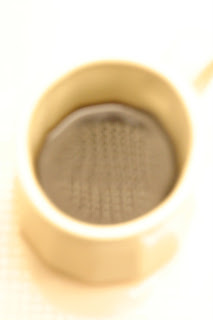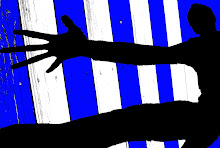Many times, when I am using a camera, I feel like an investigator. Even though my surroundings are never what I picture as being a "laboratory", I find myself conducting mini experiments to obtain the image that I have in my head. I make educated tests with lighting, surroundings, and positioning of the subject, framing, etc to create the picture that you desire. I may try a flash setting and see what happens, then change the angle of the flash, put a filter on the camera, change the approach to the subject, experiment with a deferent way to frame what I see through the lense, all of these are mini tests in which you acquire data through the resulting image. By looking at this data, my brain takes in information so that gradually I can create the exact image that I want. I guess this means that any time I am using a camera, I could potentially be in a lab. Although this is true, I must say that some of my best images require no such preemptive thought in which I think of.
An example of my laborious approach to photography is in the following images. I had a picture in mind, but initially could not find the right way to frame subject. I think I finally got what I was looking for. Can you tell what the subject is and why it looks the way it does?




As this discussion on how I have formed images in the past demonstrates, I think it absolutely necessary to view a print poam as a lab specimen. I think it is advantageous to do so. If you understand that you are working towards an end product, and are capable of stepping back with each step you make, whether it be forward or backward, and draw information from what you have done, I mean to draw conclusions about what has been understood by what you have done, you can then try again to move in the intended direction. If you have this kind of mentality and understanding of a work, you can make no mistakes and are less prone to frustration. If something does not turn out the way that you plan, do not simply trash what you have done, attempt to draw some info from it and move forward. This can be said about scientific experiments performed in scientific laboratories as well. Often times an experiment will not work as planned but you are still able to draw some conclusions from the outcomes, even though they may not lead to the exact answer in which you were searching for. These conclusions will help you get there.

1 comment:
This is brimming with the kind of thinking that for me is pure dessert
--this is really what the fork wants to bring to my mouth.
Now I Have commented on how I wanted to steal St Francis and the Sow by Galway Kinnell, a desire for theft openly admitted in Contemplating the Theft of the Sow (if you scroll down this link, that essay is the second essay at this site);
now I have admitted this, and I finally pulled off the theft in an ethical manner --I'm glad my research helped me find this method, because I was determined to pull of the heist one way or another;
I succeeded in stealing Kinnell's poem, the parts of I wanted the most, and was so pleased with the theft that I documented the theft, full lab notes, an experiment that can be duplicated, results that can be duplicated [--I would be a repeat offender--],
in this print poem: Deirdre in Kinnell's "Sant Frsncis and the Sow" with the Aid of France Bourely's Micronautics: Also the Culture of Epistle
in Tokyo Butter
But --now that I've properly set up the context for this point--
what you say in this post has renewed my need for theft --I'm stating this publicly: alert, alert, alert I WANT THESE WORDS, THIS THINKING, THIS COMMENTARY I SHOULD HAVE WRITTEN
--thanks for taking from me some glory (that evidently wasn't mine to take)
Had this incredible approach to studying a literary specimen been available to me, my lowest grade at Oberlin would not have been in an English class,
this approach right here (to clarify what I am stealing, incorporating into my comment):
"The lab setting breeds discovery. The purpose of a lab is to safely bring together tools, equipment, and people so that they can all function in unison to ask questions and attack these questions in a thought out, purposeful method. Having an engineering background, I am inclined to say that the lab is a place where discoveries can be made about something that is not understood. My experiences in lab settings have included asking questions about how cells respond to insulin, about how certain gelatin compositions can mimic human brain tissue, about how a orthopedic implant can provide strength to an injured knee. Although these experiences involve questions related to medicine, obviously a laboratory setting is not limited to medicine or engineering. A person can step into an art studio and I think this is a lab. One has a goal in mind when creating a piece. Whether they question how people will respond to the final work, or even how their mind will flow, the thought process, that it will require to make the final work, one always has the desire to understand something when working.
Many times, when I am using a camera, I feel like an investigator. Even though my surroundings are never what I picture as being a "laboratory", I find myself conducting mini experiments to obtain the image that I have in my head. I make educated tests with lighting, surroundings, and positioning of the subject, framing, etc to create the picture that you desire. I may try a flash setting and see what happens, then change the angle of the flash, put a filter on the camera, change the approach to the subject, experiment with a deferent way to frame what I see through the lense, all of these are mini tests in which you acquire data through the resulting image. By looking at this data, my brain takes in information so that gradually I can create the exact image that I want. I guess this means that any time I am using a camera, I could potentially be in a lab. Although this is true, I must say that some of my best images require no such preemptive thought in which I think of.
As this discussion on how I have formed images in the past demonstrates, I think it absolutely necessary to view a print poam as a lab specimen. I think it is advantageous to do so. If you understand that you are working towards an end product, and are capable of stepping back with each step you make, whether it be forward or backward, and draw information from what you have done, I mean to draw conclusions about what has been understood by what you have done, you can then try again to move in the intended direction. If you have this kind of mentality and understanding of a work, you can make no mistakes and are less prone to frustration. If something does not turn out the way that you plan, do not simply trash what you have done, attempt to draw some info from it and move forward. This can be said about scientific experiments performed in scientific laboratories as well. Often times an experiment will not work as planned but you are still able to draw some conclusions from the outcomes, even though they may not lead to the exact answer in which you were searching for. These conclusions will help you get there.
--it may be your post, but my comment.
Thank you!
Post a Comment